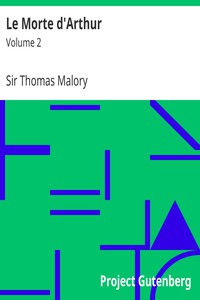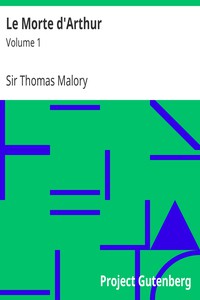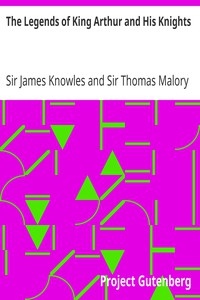Le Morte d'Arthur: Volume 2, Sir Thomas Malory [best pdf reader for ebooks .TXT] 📗

- Author: Sir Thomas Malory
Book online «Le Morte d'Arthur: Volume 2, Sir Thomas Malory [best pdf reader for ebooks .TXT] 📗». Author Sir Thomas Malory
How it was told Sir Launcelot that Dagonet chased King Mark, and how a knight overthrew him and six knights.
Now turn we again. When Sir Ganis and Sir Brandiles with his fellows came to the court of King Arthur they told the king, Sir Launcelot, and Sir Tristram, how Sir Dagonet, the fool, chased King Mark through the forest, and how the strong knight smote them down all seven with one spear. There was great laughing and japing at King Mark and at Sir Dagonet. But all these knights could not tell what knight it was that rescued King Mark. Then they asked King Mark if that he knew him, and he answered and said: He named himself the Knight that followed the Questing Beast, and on that name he sent one of my varlets to a place where was his mother; and when she heard from whence he came she made passing great dole, and discovered to my varlet his name, and said: Oh, my dear son, Sir Palomides, why wilt thou not see me? And therefore, sir, said King Mark, it is to understand his name is Sir Palomides, a noble knight. Then were all these seven knights glad that they knew his name.
Now turn we again, for on the morn they took their horses, both Sir Lamorak, Palomides, and Dinadan, with their squires and varlets, till they saw a fair castle that stood on a mountain well closed, and thither they rode, and there they found a knight that hight Galahalt, that was lord of that castle, and there they had great cheer and were well eased. Sir Dinadan, said Sir Lamorak, what will ye do? Oh sir, said Dinadan, I will to-morrow to the court of King Arthur. By my head, said Sir Palomides, I will not ride these three days, for I am sore hurt, and much have I bled, and therefore I will repose me here. Truly, said Sir Lamorak, and I will abide here with you; and when ye ride, then will I ride, unless that ye tarry over long; then will I take my horse. Therefore I pray you, Sir Dinadan, abide and ride with us. Faithfully, said Dinadan, I will not abide, for I have such a talent to see Sir Tristram that I may not abide long from him. Ah, Dinadan, said Sir Palomides, now do I understand that ye love my mortal enemy, and therefore how should I trust you. Well, said Dinadan, I love my lord Sir Tristram, above all other, and him will I serve and do honour. So shall I, said Sir Lamorak, in all that may lie in my power.
So on the morn Sir Dinadan rode unto the court of King Arthur; and by the way as he rode he saw where stood an errant knight, and made him ready for to joust. Not so, said Dinadan, for I have no will to joust. With me shall ye joust, said the knight, or that ye pass this way. Whether ask ye jousts, by love or by hate? The knight answered: Wit ye well I ask it for love, and not for hate. It may well be so, said Sir Dinadan, but ye proffer me hard love when ye will joust with me with a sharp spear. But, fair knight, said Sir Dinadan, sith ye will joust with me, meet with me in the court of King Arthur, and there shall I joust with you. Well, said the knight, sith ye will not joust with me, I pray you tell me your name. Sir knight, said he, my name is Sir Dinadan. Ah, said the knight, full well know I you for a good knight and a gentle, and wit you well I love you heartily. Then shall there be no jousts, said Dinadan, betwixt us. So they departed. And the same day he came to Camelot, where lay King Arthur. And there he saluted the king and the queen, Sir Launcelot, and Sir Tristram; and all the court was glad of Sir Dinadan, for he was gentle, wise, and courteous, and a good knight. And in especial, the valiant knight Sir Tristram loved Sir Dinadan passing well above all other knights save Sir Launcelot.
Then the king asked Sir Dinadan what adventures he had seen. Sir, said Dinadan, I have seen many adventures, and of some King Mark knoweth, but not all. Then the king hearkened Sir Dinadan, how he told that Sir Palomides and he were afore the castle of Morgan le Fay, and how Sir Lamorak took the jousts afore them, and how he forjousted twelve knights, and of them four he slew, and how after he smote down Sir Palomides and me both. t I may not believe that, said the king, for Sir Palomides is a passing good knight. That is very truth, said Sir Dinadan, but yet I saw him better proved, hand for hand. And then he told the king all that battle, and how Sir Palomides was more weaker, and more hurt, and more lost of his blood. And without doubt, said Sir Dinadan, had the battle longer lasted, Palomides had been slain. O Jesu, said King Arthur, this is to me a great marvel. Sir, said Tristram, marvel ye nothing thereof, for at mine advice there is not a valianter knight in the world living, for I know his might. And now I will say you, I was never so weary of knight but if it were Sir Launcelot. And there is no knight in the world except Sir Launcelot that did so well as Sir Lamorak. So God me help, said the king, I would that knight, Sir Lamorak, came to this Court. Sir, said Dinadan, he will be here in short space, and Sir Palomides both, but I fear that Palomides may not yet travel.
How King Arthur let do cry a jousts, and how Sir Lamorak came in, and overthrew Sir Gawaine and many other.
Then within three days after the king let make a jousting at a priory. And there made them ready many knights of the Round Table, for Sir Gawaine and his brethren made them ready to joust; but Tristram, Launcelot, nor Dinadan, would not joust, but suffered Sir Gawaine, for the love of King Arthur, with his brethren, to win the gree if they might. Then on the morn they apparelled them to joust, Sir Gawaine and his four brethren, and did there great deeds of arms. And Sir Ector de Maris did marvellously well, but Sir Gawaine passed all that fellowship; wherefore King Arthur and all the knights gave Sir Gawaine the honour at the beginning.
Right so King Arthur was ware of a knight and two squires, the which came out of a forest side, with a shield covered with leather, and then he came slyly and hurtled here and there, and anon with one spear he had smitten down two knights of the Round Table. Then with his hurtling he lost the covering of his shield, then was the king and all other ware that he bare a red shield. O Jesu, said King Arthur, see where rideth a stout knight, he with the red shield. And there was noise and crying: Beware the Knight with the Red Shield. So within a little while he had overthrown three brethren of Sir Gawaine’s. So God me help, said King Arthur, meseemeth yonder is the best jouster that ever I saw. With that he saw him encounter with Sir Gawaine, and he smote him down with so great force that he made his horse to avoid his saddle. How now, said the king, Sir Gawaine hath a fall; well were me an I knew what knight he were with the red shield. I know him well, said Dinadan, but as at this time ye shall not know his name. By my head, said Sir Tristram, he jousted better than Sir Palomides, and if ye list to know his name, wit ye well his name is Sir Lamorak de Galis.
As they stood thus talking, Sir Gawaine and he encountered together again, and there he smote Sir Gawaine from his horse, and bruised him sore. And in the sight of King Arthur he smote down twenty knights, beside Sir Gawaine and his brethren. And so clearly was the prize given him as a knight peerless. Then slyly and marvellously Sir Lamorak withdrew him from all the fellowship into the forest side. All this espied King Arthur, for his eye went never from him. Then the king, Sir Launcelot, Sir Tristram, and Sir Dinadan, took their hackneys, and rode straight after the good knight, Sir Lamorak de Galis, and there found him. And thus said the king: Ah, fair knight, well be ye found. When he saw the king he put off his helm and saluted him, and when he saw Sir Tristram he alighted down off his horse and ran to him to take him by the thighs, but Sir Tristram would not suffer him, but he alighted or that he came, and either took other in arms, and made great joy of other. The king was glad, and also was all the fellowship of the Round Table, except Sir Gawaine and his brethren. And when they wist that he was Sir Lamorak, they had great despite at him, and were wonderly wroth with him that he had put him to dishonour that day.
Then Gawaine called privily in council all his brethren, and to them said thus: Fair brethren, here may ye see, whom that we hate King Arthur loveth, and whom that we love he hateth. And wit ye well, my fair brethren, that this Sir Lamorak will never love us, because we slew his father, King Pellinore, for we deemed that he slew our father, King of Orkney. And for the despite of Pellinore, Sir Lamorak did us a shame to our mother, therefore I will be revenged. Sir, said Sir Gawaine’s brethren, let see how ye will or may be revenged, and ye shall find us ready. Well, said Gawaine, hold you still and we shall espy our time.
How King Arthur made King Mark to be accorded with Sir Tristram, and how they departed toward Cornwall.
Now pass we our matter, and leave we Sir Gawaine, and speak of King Arthur, that on a day said unto King Mark: Sir, I





Comments (0)